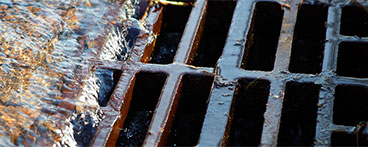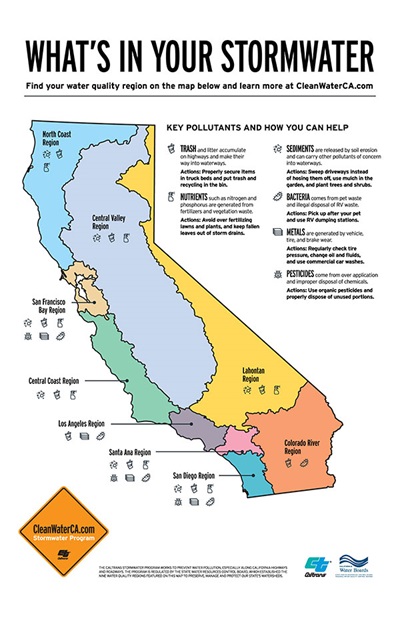About Stormwater

What is Stormwater?
Stormwater is the excess water from rain, snowmelt and irrigation that doesn’t absorb into the ground and becomes surface runoff. By itself, stormwater isn’t a bad thing. We need stormwater to directly refill aquifers and reservoirs, nourish vegetation and farmlands, and avoid drought.
But polluted stormwater can be more dangerous than the water that goes down a sink or toilet in your home. This is because stormwater is untreated and flows directly into lakes, rivers or the ocean. In contrast, dirty water from our sinks and toilets go first to water treatment facilities. Stormwater becomes polluted when it flushes from our roads, driveways and lawns improperly disposed trash, bacteria from pet waste, and dangerous chemicals straight into waterways. This harms all of us and all parts of our environment.
This is why it is important to eliminate litter from our roads and prevent dangerous chemicals of all kinds from washing into stormways and gutters – both when on the road and at home.
Here are ways you can help prevent stormwater pollution:
- Plan ahead when traveling with pets, their waste needs to be properly disposed.
- Keep your tires properly inflated to prevent wear and tear and reduce heavy metal pollution. Plus, you’ll get better gas mileage.
- Regularly maintain vehicles to prevent auto fluid leaks from dripping onto roadways.
- Wipe down tire wheel wells to remove brake dust. Copper metals found in brakes are a major pollutant.
- Keep your vehicle clean and use a car wash facility that recycles their water.
- Choose to use non-toxic products in your home’s outdoor spaces, and never apply them before wind or rain are in the forecast.
- Properly dispose of trash and recycling. This includes cigarette butts, which are the number one littered item.
- Always secure vehicle loads to reduce debris and roadway hazards.
Why does stormwater matter?
On its journey to storm drain inlets, stormwater captures pollutants from highways, streets, sidewalks, and yards. Common pollutants can be chemicals from lawns and yards, pet waste, leaked auto fluids, cigarette butts, litter, trash and much more.
Polluted stormwater doesn’t go through wastewater treatment so it ends up directly deposited into waterways along with any contaminants that have accumulated.
Stormwater matters because it affects the quality of water used daily by humans, as well as wildlife in our local ecosystems.
How does stormwater impact me?
Stormwater directly impacts the quality of our waterways, neighborhoods, communities, and environment.
- Polluted stormwater is a significant source of overall water pollution in California.
- When polluted stormwater flows into our waterways, it greatly reduces the quality of water used for recreation, drinking, washing and fishing.
- Over 14.8 million vehicles are on the road in our state, which means there a lot contributors to litter, motor oil, heavy metals, and other auto fluids on our highways.
- Stormwater pollution can lead to unsanitary living conditions and neighborhood flooding during the rainy season.
Small actions can have a major impact on our waterways, let’s all work together to change our habits and prevent stormwater pollution.
Stormwater Links

Waterways
Unlike sewer systems - which lead to a wastewater treatment plant - storm drains empty directly into waterways, depositing untreated stormwater.

Pet Waste
Pet waste is very toxic—the EPA estimates that waste produced by just 100 dogs in one weekend can contain enough bacteria to temporarily close a bay to swimming and shellfishing. Always pick up after your pet!


